The Global Financial Crisis and its Impact on Economic Governance
VerifiedAdded on 2023/06/09
|8
|1852
|209
Essay
AI Summary
This essay explores the profound impact of the 2007-2008 Global Financial Crisis (GFC) on the international political economy and global economic governance. It examines how the crisis, originating in the U.S. subprime mortgage market and escalating with the collapse of Lehman Brothers, triggered a global recession and prompted policymakers to seek reforms in economic governance. The essay discusses the limitations of the WTO, IMF, and G20 in addressing the crisis and analyzes various models for reforming global economic governance. It highlights the shift towards multilateralism, the coordinated actions of central banks, and the emergence of new international institutions like the Financial Stability Board. Furthermore, the essay emphasizes the need for the G20 and other multilateral institutions to broaden their agenda to ensure more robust and inclusive economic growth, addressing issues such as current account imbalances and the distribution of gains from economic globalization. Ultimately, it argues that the GFC has presented both challenges and opportunities for reshaping the international economic order.
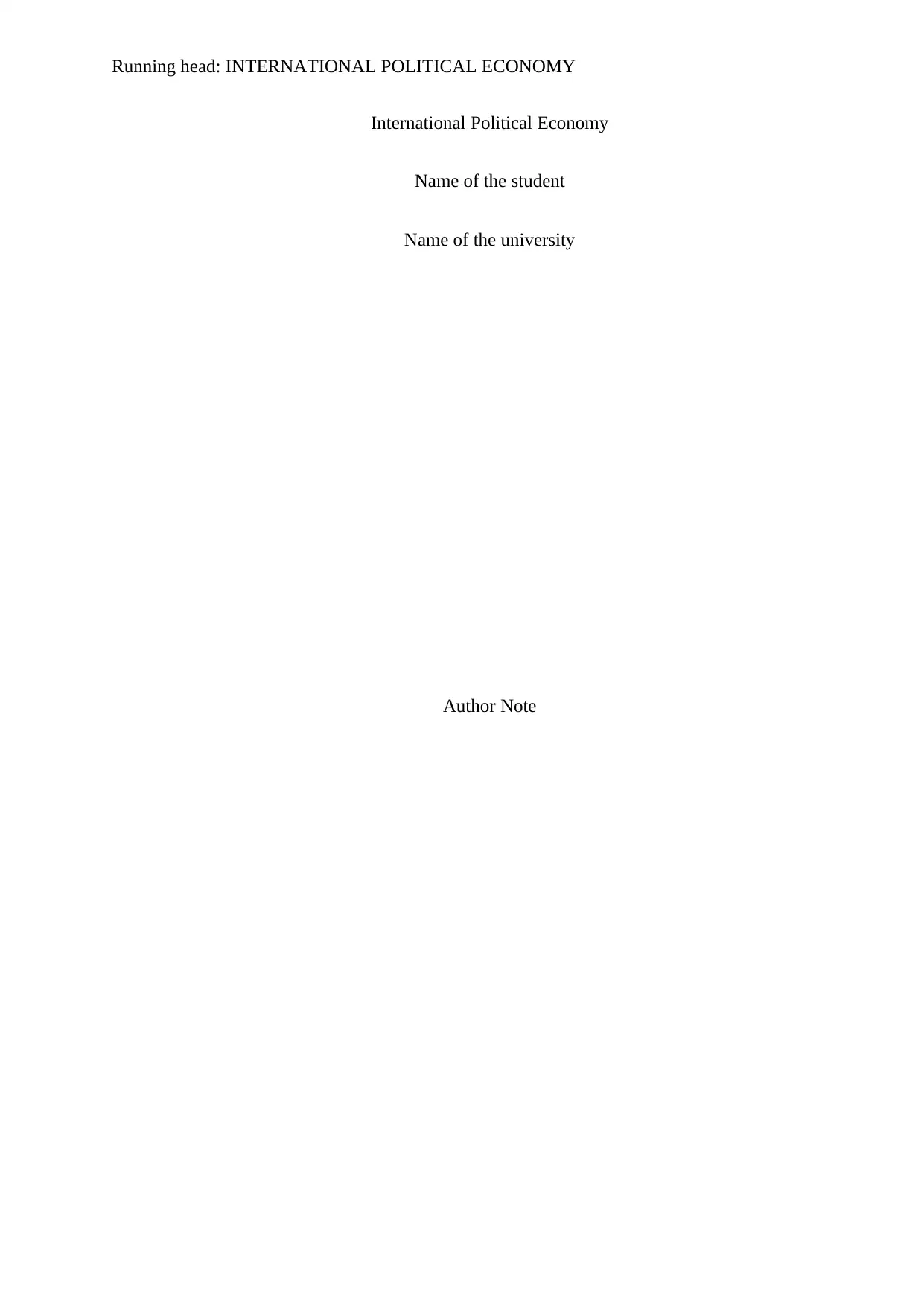
Running head: INTERNATIONAL POLITICAL ECONOMY
International Political Economy
Name of the student
Name of the university
Author Note
International Political Economy
Name of the student
Name of the university
Author Note
Paraphrase This Document
Need a fresh take? Get an instant paraphrase of this document with our AI Paraphraser
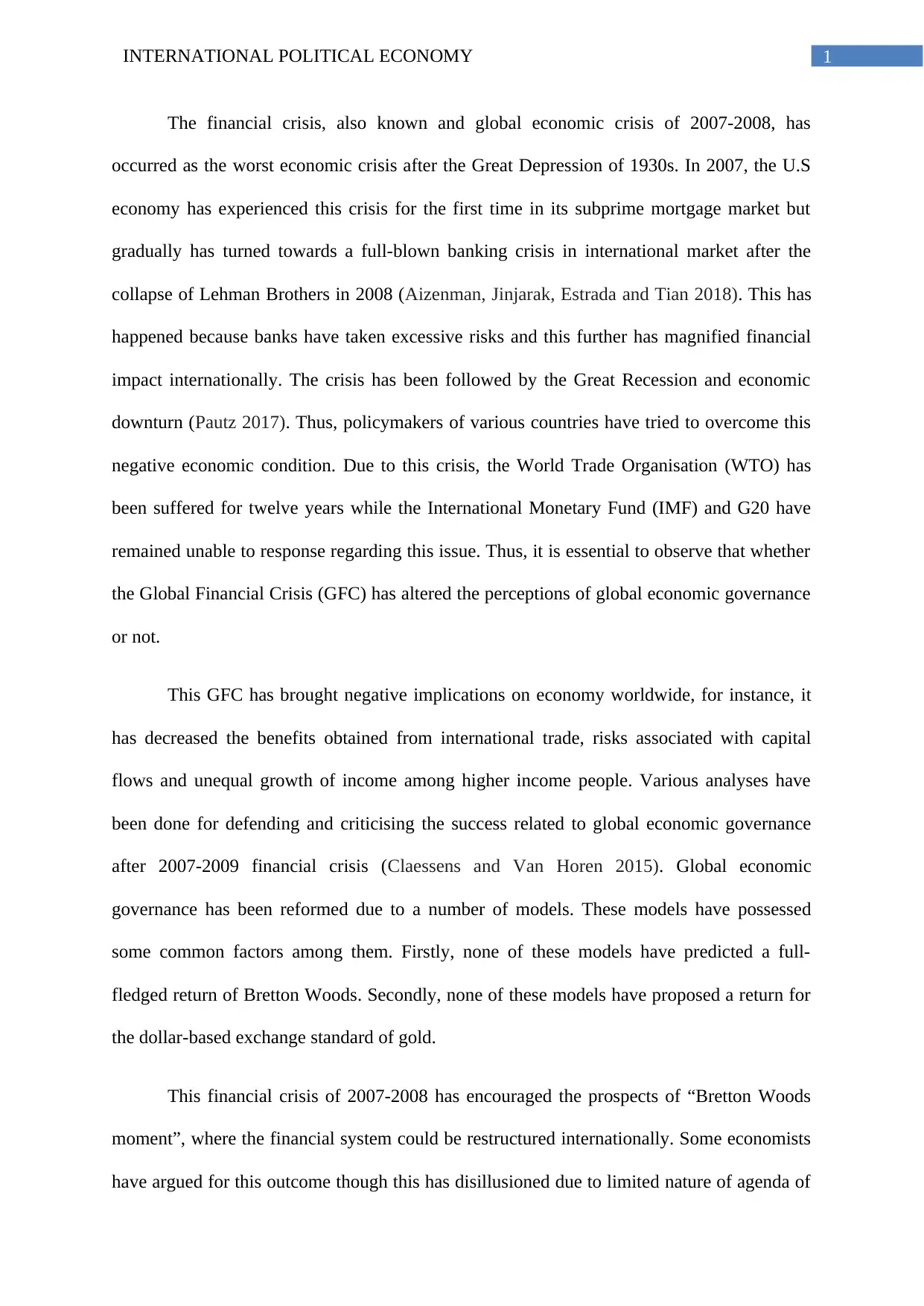
1INTERNATIONAL POLITICAL ECONOMY
The financial crisis, also known and global economic crisis of 2007-2008, has
occurred as the worst economic crisis after the Great Depression of 1930s. In 2007, the U.S
economy has experienced this crisis for the first time in its subprime mortgage market but
gradually has turned towards a full-blown banking crisis in international market after the
collapse of Lehman Brothers in 2008 (Aizenman, Jinjarak, Estrada and Tian 2018). This has
happened because banks have taken excessive risks and this further has magnified financial
impact internationally. The crisis has been followed by the Great Recession and economic
downturn (Pautz 2017). Thus, policymakers of various countries have tried to overcome this
negative economic condition. Due to this crisis, the World Trade Organisation (WTO) has
been suffered for twelve years while the International Monetary Fund (IMF) and G20 have
remained unable to response regarding this issue. Thus, it is essential to observe that whether
the Global Financial Crisis (GFC) has altered the perceptions of global economic governance
or not.
This GFC has brought negative implications on economy worldwide, for instance, it
has decreased the benefits obtained from international trade, risks associated with capital
flows and unequal growth of income among higher income people. Various analyses have
been done for defending and criticising the success related to global economic governance
after 2007-2009 financial crisis (Claessens and Van Horen 2015). Global economic
governance has been reformed due to a number of models. These models have possessed
some common factors among them. Firstly, none of these models have predicted a full-
fledged return of Bretton Woods. Secondly, none of these models have proposed a return for
the dollar-based exchange standard of gold.
This financial crisis of 2007-2008 has encouraged the prospects of “Bretton Woods
moment”, where the financial system could be restructured internationally. Some economists
have argued for this outcome though this has disillusioned due to limited nature of agenda of
The financial crisis, also known and global economic crisis of 2007-2008, has
occurred as the worst economic crisis after the Great Depression of 1930s. In 2007, the U.S
economy has experienced this crisis for the first time in its subprime mortgage market but
gradually has turned towards a full-blown banking crisis in international market after the
collapse of Lehman Brothers in 2008 (Aizenman, Jinjarak, Estrada and Tian 2018). This has
happened because banks have taken excessive risks and this further has magnified financial
impact internationally. The crisis has been followed by the Great Recession and economic
downturn (Pautz 2017). Thus, policymakers of various countries have tried to overcome this
negative economic condition. Due to this crisis, the World Trade Organisation (WTO) has
been suffered for twelve years while the International Monetary Fund (IMF) and G20 have
remained unable to response regarding this issue. Thus, it is essential to observe that whether
the Global Financial Crisis (GFC) has altered the perceptions of global economic governance
or not.
This GFC has brought negative implications on economy worldwide, for instance, it
has decreased the benefits obtained from international trade, risks associated with capital
flows and unequal growth of income among higher income people. Various analyses have
been done for defending and criticising the success related to global economic governance
after 2007-2009 financial crisis (Claessens and Van Horen 2015). Global economic
governance has been reformed due to a number of models. These models have possessed
some common factors among them. Firstly, none of these models have predicted a full-
fledged return of Bretton Woods. Secondly, none of these models have proposed a return for
the dollar-based exchange standard of gold.
This financial crisis of 2007-2008 has encouraged the prospects of “Bretton Woods
moment”, where the financial system could be restructured internationally. Some economists
have argued for this outcome though this has disillusioned due to limited nature of agenda of
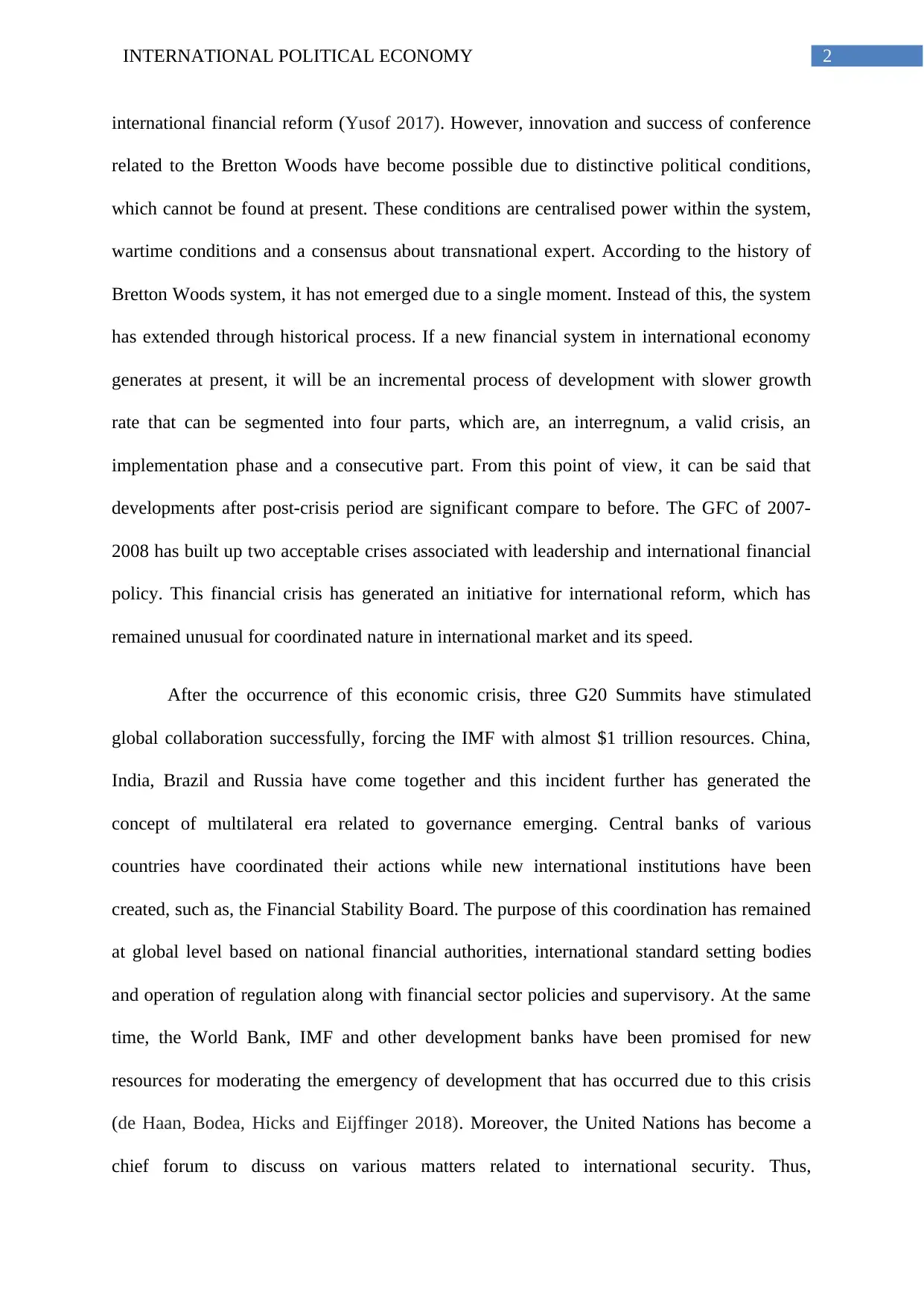
2INTERNATIONAL POLITICAL ECONOMY
international financial reform (Yusof 2017). However, innovation and success of conference
related to the Bretton Woods have become possible due to distinctive political conditions,
which cannot be found at present. These conditions are centralised power within the system,
wartime conditions and a consensus about transnational expert. According to the history of
Bretton Woods system, it has not emerged due to a single moment. Instead of this, the system
has extended through historical process. If a new financial system in international economy
generates at present, it will be an incremental process of development with slower growth
rate that can be segmented into four parts, which are, an interregnum, a valid crisis, an
implementation phase and a consecutive part. From this point of view, it can be said that
developments after post-crisis period are significant compare to before. The GFC of 2007-
2008 has built up two acceptable crises associated with leadership and international financial
policy. This financial crisis has generated an initiative for international reform, which has
remained unusual for coordinated nature in international market and its speed.
After the occurrence of this economic crisis, three G20 Summits have stimulated
global collaboration successfully, forcing the IMF with almost $1 trillion resources. China,
India, Brazil and Russia have come together and this incident further has generated the
concept of multilateral era related to governance emerging. Central banks of various
countries have coordinated their actions while new international institutions have been
created, such as, the Financial Stability Board. The purpose of this coordination has remained
at global level based on national financial authorities, international standard setting bodies
and operation of regulation along with financial sector policies and supervisory. At the same
time, the World Bank, IMF and other development banks have been promised for new
resources for moderating the emergency of development that has occurred due to this crisis
(de Haan, Bodea, Hicks and Eijffinger 2018). Moreover, the United Nations has become a
chief forum to discuss on various matters related to international security. Thus,
international financial reform (Yusof 2017). However, innovation and success of conference
related to the Bretton Woods have become possible due to distinctive political conditions,
which cannot be found at present. These conditions are centralised power within the system,
wartime conditions and a consensus about transnational expert. According to the history of
Bretton Woods system, it has not emerged due to a single moment. Instead of this, the system
has extended through historical process. If a new financial system in international economy
generates at present, it will be an incremental process of development with slower growth
rate that can be segmented into four parts, which are, an interregnum, a valid crisis, an
implementation phase and a consecutive part. From this point of view, it can be said that
developments after post-crisis period are significant compare to before. The GFC of 2007-
2008 has built up two acceptable crises associated with leadership and international financial
policy. This financial crisis has generated an initiative for international reform, which has
remained unusual for coordinated nature in international market and its speed.
After the occurrence of this economic crisis, three G20 Summits have stimulated
global collaboration successfully, forcing the IMF with almost $1 trillion resources. China,
India, Brazil and Russia have come together and this incident further has generated the
concept of multilateral era related to governance emerging. Central banks of various
countries have coordinated their actions while new international institutions have been
created, such as, the Financial Stability Board. The purpose of this coordination has remained
at global level based on national financial authorities, international standard setting bodies
and operation of regulation along with financial sector policies and supervisory. At the same
time, the World Bank, IMF and other development banks have been promised for new
resources for moderating the emergency of development that has occurred due to this crisis
(de Haan, Bodea, Hicks and Eijffinger 2018). Moreover, the United Nations has become a
chief forum to discuss on various matters related to international security. Thus,
⊘ This is a preview!⊘
Do you want full access?
Subscribe today to unlock all pages.

Trusted by 1+ million students worldwide
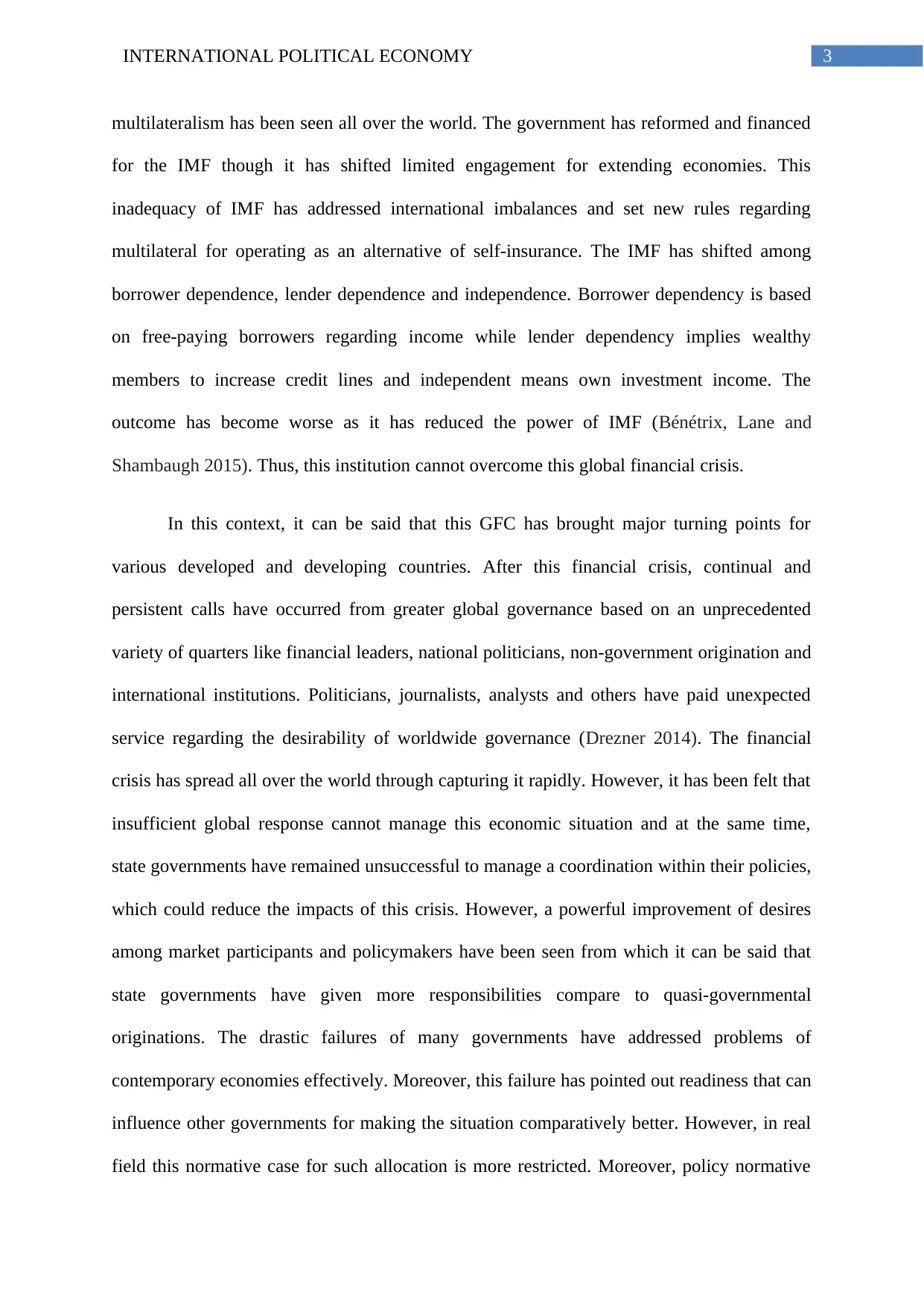
3INTERNATIONAL POLITICAL ECONOMY
multilateralism has been seen all over the world. The government has reformed and financed
for the IMF though it has shifted limited engagement for extending economies. This
inadequacy of IMF has addressed international imbalances and set new rules regarding
multilateral for operating as an alternative of self-insurance. The IMF has shifted among
borrower dependence, lender dependence and independence. Borrower dependency is based
on free-paying borrowers regarding income while lender dependency implies wealthy
members to increase credit lines and independent means own investment income. The
outcome has become worse as it has reduced the power of IMF (Bénétrix, Lane and
Shambaugh 2015). Thus, this institution cannot overcome this global financial crisis.
In this context, it can be said that this GFC has brought major turning points for
various developed and developing countries. After this financial crisis, continual and
persistent calls have occurred from greater global governance based on an unprecedented
variety of quarters like financial leaders, national politicians, non-government origination and
international institutions. Politicians, journalists, analysts and others have paid unexpected
service regarding the desirability of worldwide governance (Drezner 2014). The financial
crisis has spread all over the world through capturing it rapidly. However, it has been felt that
insufficient global response cannot manage this economic situation and at the same time,
state governments have remained unsuccessful to manage a coordination within their policies,
which could reduce the impacts of this crisis. However, a powerful improvement of desires
among market participants and policymakers have been seen from which it can be said that
state governments have given more responsibilities compare to quasi-governmental
originations. The drastic failures of many governments have addressed problems of
contemporary economies effectively. Moreover, this failure has pointed out readiness that can
influence other governments for making the situation comparatively better. However, in real
field this normative case for such allocation is more restricted. Moreover, policy normative
multilateralism has been seen all over the world. The government has reformed and financed
for the IMF though it has shifted limited engagement for extending economies. This
inadequacy of IMF has addressed international imbalances and set new rules regarding
multilateral for operating as an alternative of self-insurance. The IMF has shifted among
borrower dependence, lender dependence and independence. Borrower dependency is based
on free-paying borrowers regarding income while lender dependency implies wealthy
members to increase credit lines and independent means own investment income. The
outcome has become worse as it has reduced the power of IMF (Bénétrix, Lane and
Shambaugh 2015). Thus, this institution cannot overcome this global financial crisis.
In this context, it can be said that this GFC has brought major turning points for
various developed and developing countries. After this financial crisis, continual and
persistent calls have occurred from greater global governance based on an unprecedented
variety of quarters like financial leaders, national politicians, non-government origination and
international institutions. Politicians, journalists, analysts and others have paid unexpected
service regarding the desirability of worldwide governance (Drezner 2014). The financial
crisis has spread all over the world through capturing it rapidly. However, it has been felt that
insufficient global response cannot manage this economic situation and at the same time,
state governments have remained unsuccessful to manage a coordination within their policies,
which could reduce the impacts of this crisis. However, a powerful improvement of desires
among market participants and policymakers have been seen from which it can be said that
state governments have given more responsibilities compare to quasi-governmental
originations. The drastic failures of many governments have addressed problems of
contemporary economies effectively. Moreover, this failure has pointed out readiness that can
influence other governments for making the situation comparatively better. However, in real
field this normative case for such allocation is more restricted. Moreover, policy normative
Paraphrase This Document
Need a fresh take? Get an instant paraphrase of this document with our AI Paraphraser
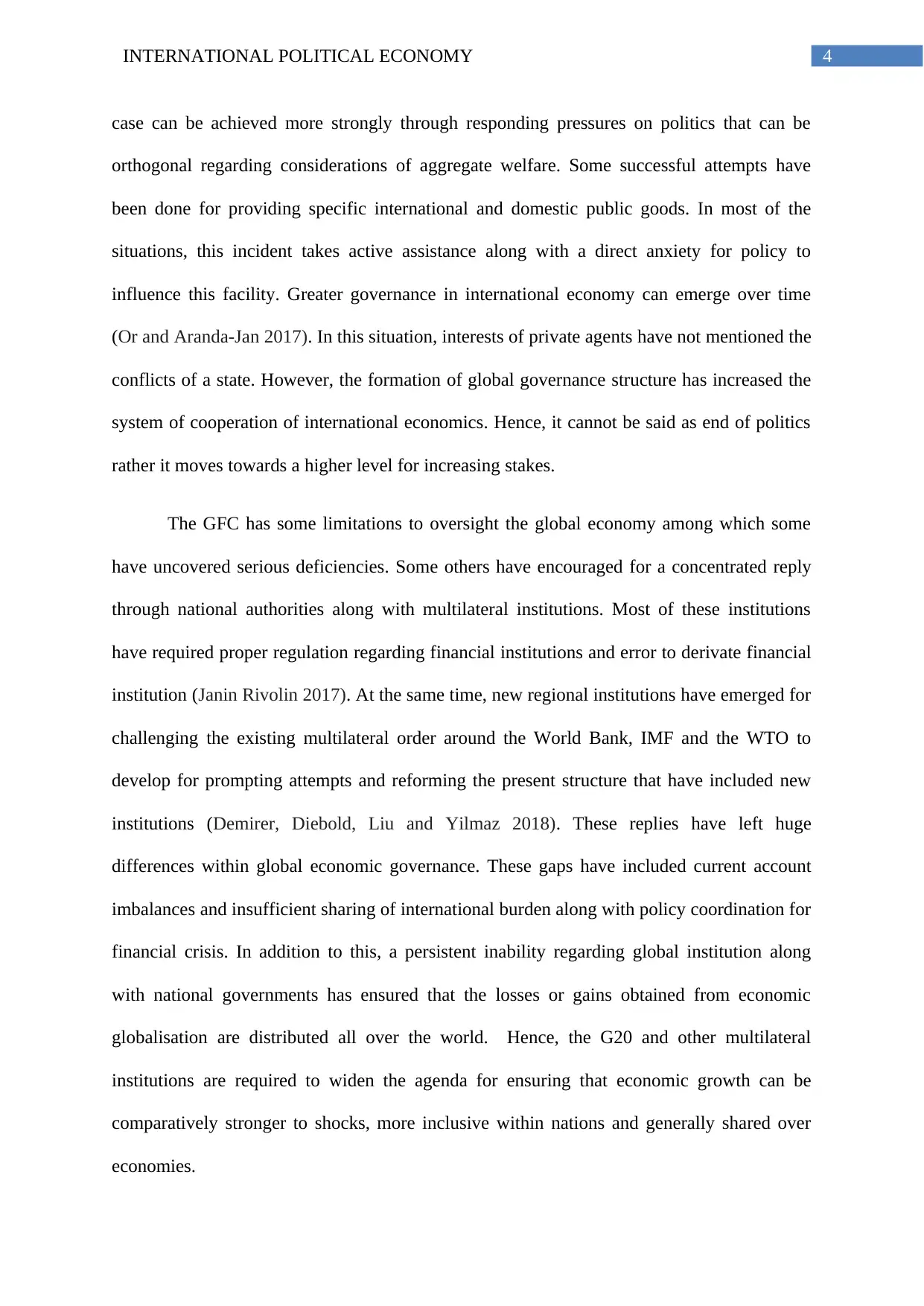
4INTERNATIONAL POLITICAL ECONOMY
case can be achieved more strongly through responding pressures on politics that can be
orthogonal regarding considerations of aggregate welfare. Some successful attempts have
been done for providing specific international and domestic public goods. In most of the
situations, this incident takes active assistance along with a direct anxiety for policy to
influence this facility. Greater governance in international economy can emerge over time
(Or and Aranda‐Jan 2017). In this situation, interests of private agents have not mentioned the
conflicts of a state. However, the formation of global governance structure has increased the
system of cooperation of international economics. Hence, it cannot be said as end of politics
rather it moves towards a higher level for increasing stakes.
The GFC has some limitations to oversight the global economy among which some
have uncovered serious deficiencies. Some others have encouraged for a concentrated reply
through national authorities along with multilateral institutions. Most of these institutions
have required proper regulation regarding financial institutions and error to derivate financial
institution (Janin Rivolin 2017). At the same time, new regional institutions have emerged for
challenging the existing multilateral order around the World Bank, IMF and the WTO to
develop for prompting attempts and reforming the present structure that have included new
institutions (Demirer, Diebold, Liu and Yilmaz 2018). These replies have left huge
differences within global economic governance. These gaps have included current account
imbalances and insufficient sharing of international burden along with policy coordination for
financial crisis. In addition to this, a persistent inability regarding global institution along
with national governments has ensured that the losses or gains obtained from economic
globalisation are distributed all over the world. Hence, the G20 and other multilateral
institutions are required to widen the agenda for ensuring that economic growth can be
comparatively stronger to shocks, more inclusive within nations and generally shared over
economies.
case can be achieved more strongly through responding pressures on politics that can be
orthogonal regarding considerations of aggregate welfare. Some successful attempts have
been done for providing specific international and domestic public goods. In most of the
situations, this incident takes active assistance along with a direct anxiety for policy to
influence this facility. Greater governance in international economy can emerge over time
(Or and Aranda‐Jan 2017). In this situation, interests of private agents have not mentioned the
conflicts of a state. However, the formation of global governance structure has increased the
system of cooperation of international economics. Hence, it cannot be said as end of politics
rather it moves towards a higher level for increasing stakes.
The GFC has some limitations to oversight the global economy among which some
have uncovered serious deficiencies. Some others have encouraged for a concentrated reply
through national authorities along with multilateral institutions. Most of these institutions
have required proper regulation regarding financial institutions and error to derivate financial
institution (Janin Rivolin 2017). At the same time, new regional institutions have emerged for
challenging the existing multilateral order around the World Bank, IMF and the WTO to
develop for prompting attempts and reforming the present structure that have included new
institutions (Demirer, Diebold, Liu and Yilmaz 2018). These replies have left huge
differences within global economic governance. These gaps have included current account
imbalances and insufficient sharing of international burden along with policy coordination for
financial crisis. In addition to this, a persistent inability regarding global institution along
with national governments has ensured that the losses or gains obtained from economic
globalisation are distributed all over the world. Hence, the G20 and other multilateral
institutions are required to widen the agenda for ensuring that economic growth can be
comparatively stronger to shocks, more inclusive within nations and generally shared over
economies.
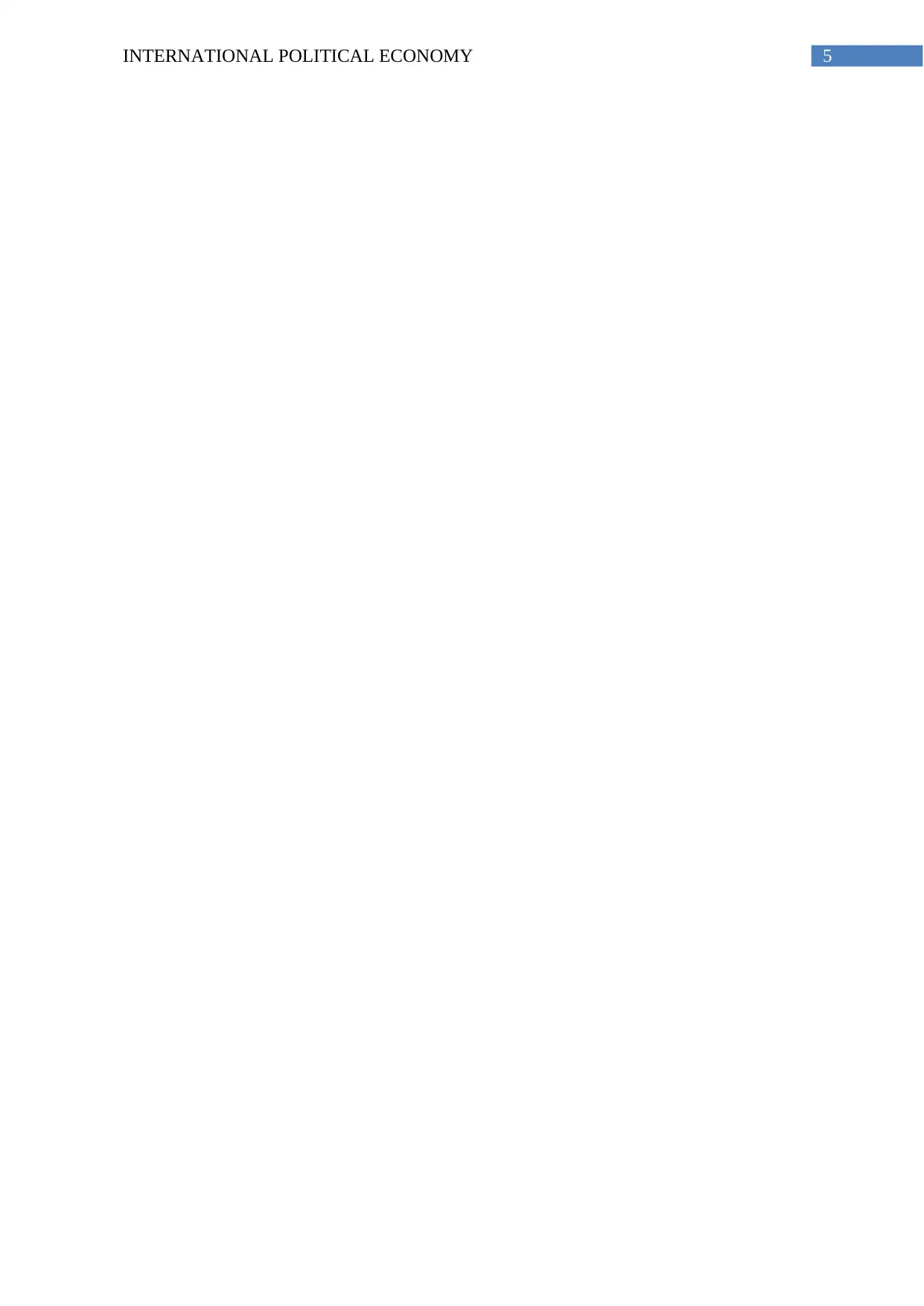
5INTERNATIONAL POLITICAL ECONOMY
⊘ This is a preview!⊘
Do you want full access?
Subscribe today to unlock all pages.

Trusted by 1+ million students worldwide
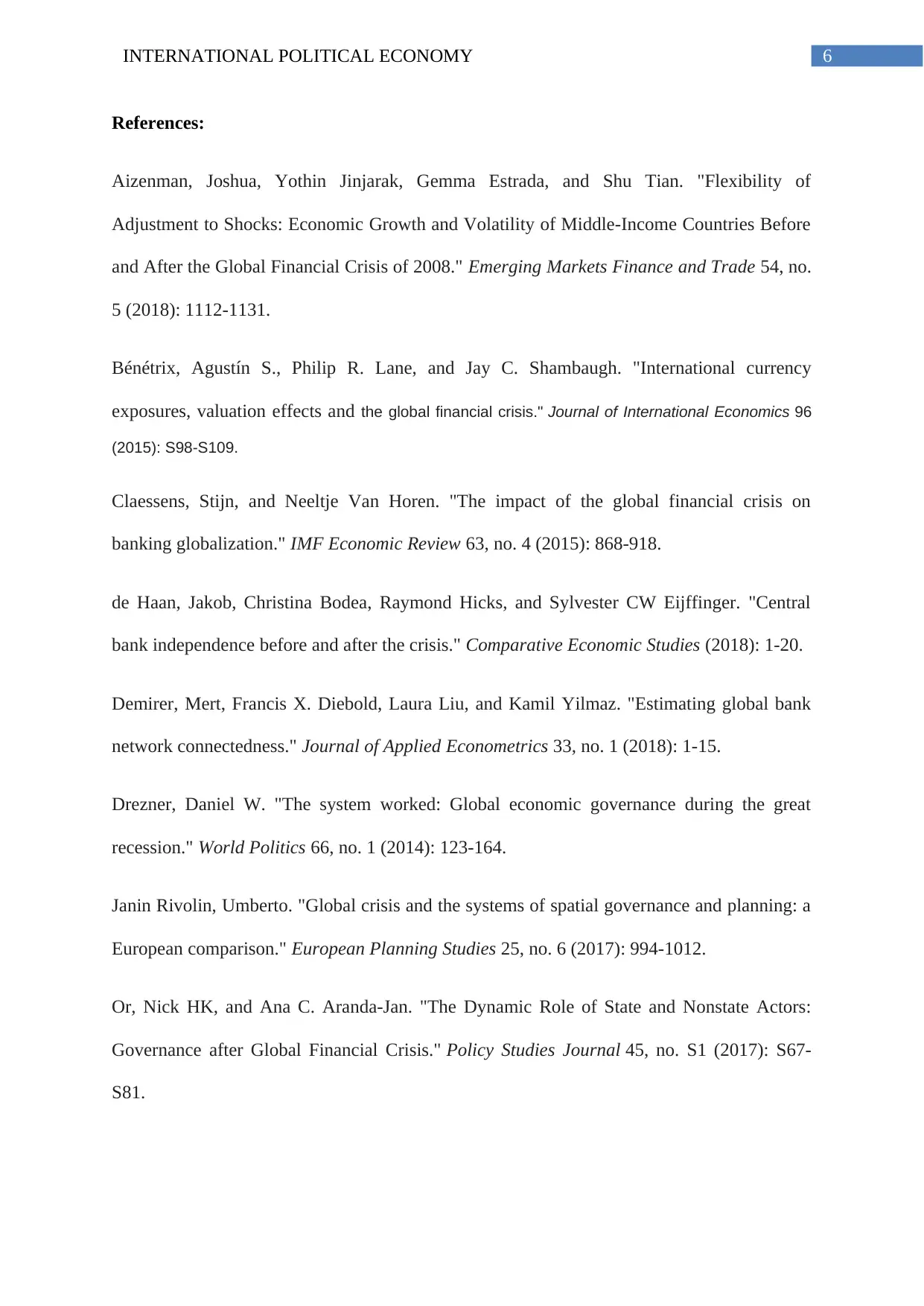
6INTERNATIONAL POLITICAL ECONOMY
References:
Aizenman, Joshua, Yothin Jinjarak, Gemma Estrada, and Shu Tian. "Flexibility of
Adjustment to Shocks: Economic Growth and Volatility of Middle-Income Countries Before
and After the Global Financial Crisis of 2008." Emerging Markets Finance and Trade 54, no.
5 (2018): 1112-1131.
Bénétrix, Agustín S., Philip R. Lane, and Jay C. Shambaugh. "International currency
exposures, valuation effects and the global financial crisis." Journal of International Economics 96
(2015): S98-S109.
Claessens, Stijn, and Neeltje Van Horen. "The impact of the global financial crisis on
banking globalization." IMF Economic Review 63, no. 4 (2015): 868-918.
de Haan, Jakob, Christina Bodea, Raymond Hicks, and Sylvester CW Eijffinger. "Central
bank independence before and after the crisis." Comparative Economic Studies (2018): 1-20.
Demirer, Mert, Francis X. Diebold, Laura Liu, and Kamil Yilmaz. "Estimating global bank
network connectedness." Journal of Applied Econometrics 33, no. 1 (2018): 1-15.
Drezner, Daniel W. "The system worked: Global economic governance during the great
recession." World Politics 66, no. 1 (2014): 123-164.
Janin Rivolin, Umberto. "Global crisis and the systems of spatial governance and planning: a
European comparison." European Planning Studies 25, no. 6 (2017): 994-1012.
Or, Nick HK, and Ana C. Aranda‐Jan. "The Dynamic Role of State and Nonstate Actors:
Governance after Global Financial Crisis." Policy Studies Journal 45, no. S1 (2017): S67-
S81.
References:
Aizenman, Joshua, Yothin Jinjarak, Gemma Estrada, and Shu Tian. "Flexibility of
Adjustment to Shocks: Economic Growth and Volatility of Middle-Income Countries Before
and After the Global Financial Crisis of 2008." Emerging Markets Finance and Trade 54, no.
5 (2018): 1112-1131.
Bénétrix, Agustín S., Philip R. Lane, and Jay C. Shambaugh. "International currency
exposures, valuation effects and the global financial crisis." Journal of International Economics 96
(2015): S98-S109.
Claessens, Stijn, and Neeltje Van Horen. "The impact of the global financial crisis on
banking globalization." IMF Economic Review 63, no. 4 (2015): 868-918.
de Haan, Jakob, Christina Bodea, Raymond Hicks, and Sylvester CW Eijffinger. "Central
bank independence before and after the crisis." Comparative Economic Studies (2018): 1-20.
Demirer, Mert, Francis X. Diebold, Laura Liu, and Kamil Yilmaz. "Estimating global bank
network connectedness." Journal of Applied Econometrics 33, no. 1 (2018): 1-15.
Drezner, Daniel W. "The system worked: Global economic governance during the great
recession." World Politics 66, no. 1 (2014): 123-164.
Janin Rivolin, Umberto. "Global crisis and the systems of spatial governance and planning: a
European comparison." European Planning Studies 25, no. 6 (2017): 994-1012.
Or, Nick HK, and Ana C. Aranda‐Jan. "The Dynamic Role of State and Nonstate Actors:
Governance after Global Financial Crisis." Policy Studies Journal 45, no. S1 (2017): S67-
S81.
Paraphrase This Document
Need a fresh take? Get an instant paraphrase of this document with our AI Paraphraser
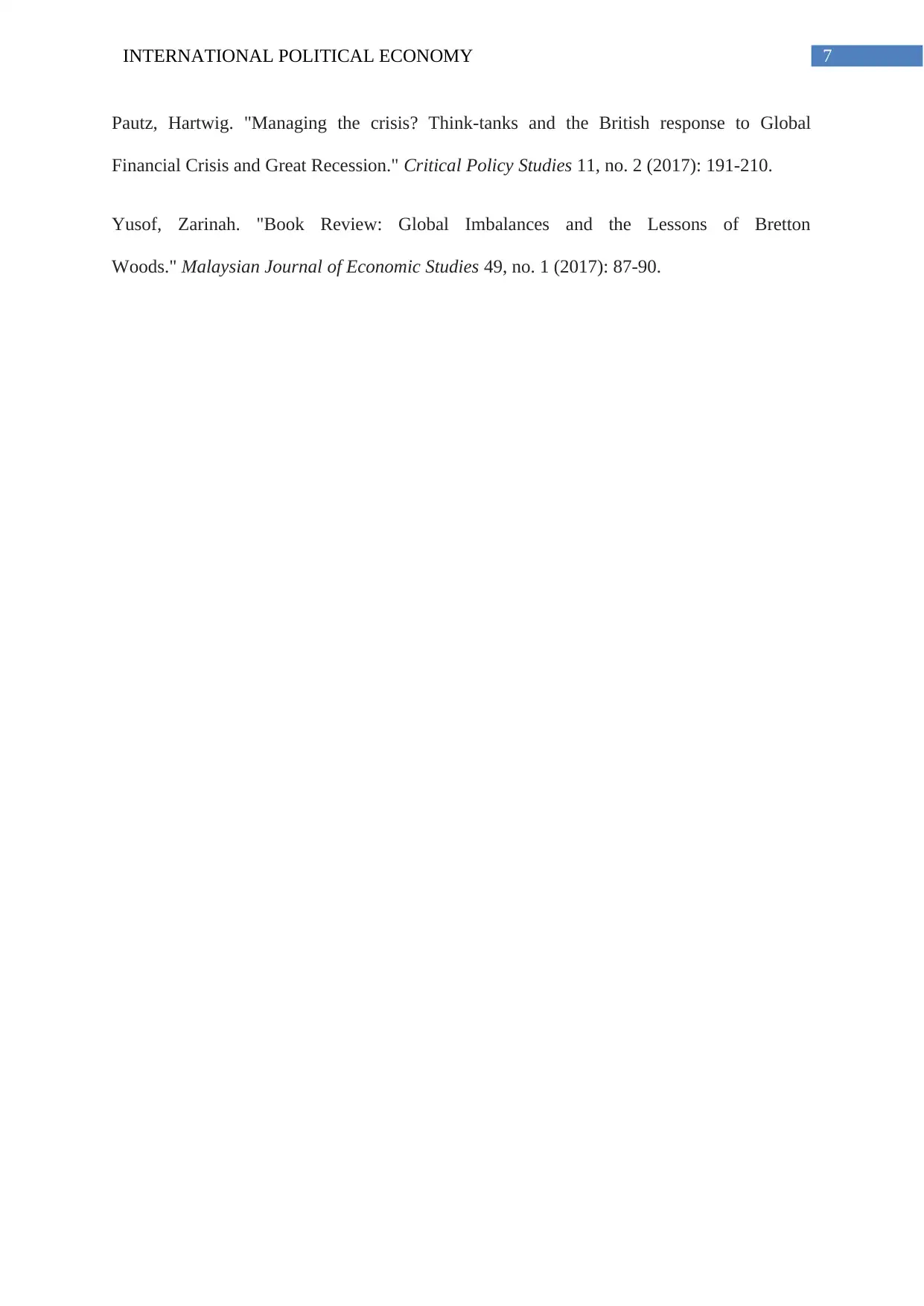
7INTERNATIONAL POLITICAL ECONOMY
Pautz, Hartwig. "Managing the crisis? Think-tanks and the British response to Global
Financial Crisis and Great Recession." Critical Policy Studies 11, no. 2 (2017): 191-210.
Yusof, Zarinah. "Book Review: Global Imbalances and the Lessons of Bretton
Woods." Malaysian Journal of Economic Studies 49, no. 1 (2017): 87-90.
Pautz, Hartwig. "Managing the crisis? Think-tanks and the British response to Global
Financial Crisis and Great Recession." Critical Policy Studies 11, no. 2 (2017): 191-210.
Yusof, Zarinah. "Book Review: Global Imbalances and the Lessons of Bretton
Woods." Malaysian Journal of Economic Studies 49, no. 1 (2017): 87-90.
1 out of 8
Related Documents
Your All-in-One AI-Powered Toolkit for Academic Success.
+13062052269
info@desklib.com
Available 24*7 on WhatsApp / Email
![[object Object]](/_next/static/media/star-bottom.7253800d.svg)
Unlock your academic potential
Copyright © 2020–2026 A2Z Services. All Rights Reserved. Developed and managed by ZUCOL.





